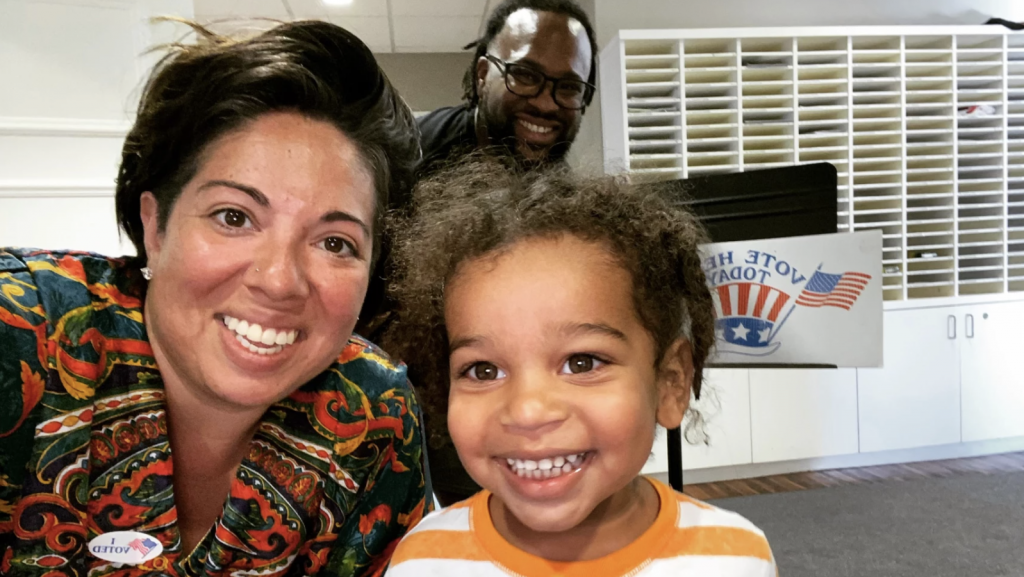What’s shaping Michigan’s Latino electorate ahead of the elections
Michelle Jokisch Polo September 27, 2024Many have long assumed that Latino voters are mostly loyal to the Democratic party, but as the demographic has grown so has their range of political leanings.

Vanessa Jimenez with son Devani Jimenez-Bailey and husband D'Angelo Bailey.
With nearly 400,000 eligible Latino voters in Michigan the group could play a significant role in how the state swings on election day. It has long been assumed that Latino voters would be loyal to the Democratic party, but as the demographic has continued to grow so has their range of political leanings.
Since 2020, there has been a three percent shift among Michigan Latinos favoring the Republican Party, with 25% of Latinos voting for a GOP candidate, according to exit poll data from the nonpartisan organization UnidosUS.
Michael Becerril said he stopped voting for the Democratic party after the 2008 election when he voted for former President Barack Obama. He told WKAR the party has strayed from Christian values particularly when it comes to same sex marriage, transgender rights and abortion.
“I don’t like the fact that the Democrats took church out of public school, because I grew up saying the Pledge of Allegiance and talking about,” he said. “These Democrats most of them are not Christian, and I have Christian morals.”
The Millennial said he is planning to cast his ballot for former President Donald Trump, for the third time, because of his stances on the economy and immigration.
“I want inflation to go down and I want these 10 million illegal immigrants that are arriving into our country and I want that to be stopped,” he added.
Becerril is likely to be in the minority among Latinos in Michigan. In the last two elections more than 70% of Latino voters have voted Democrat.
Jamie Saliba said she is planning to vote for Vice President Kamala Harris in November, marking the first time the 20-year-old casts a ballot in a U.S. Presidential race.
Saliba is one of more than 100,000 people who voted “uncommitted” in Michigan’s primary election to send President Biden a message about his refusal to call for a permanent cease-fire in Gaza.
“I’m not a big fan of Kamala. I’m not like her biggest supporter. However, I do recognize that we need her in the White House to be able to maintain all of our freedoms,” Saliba said.
The Michigan State University student said she would like to see Harris take a stronger stand against Israel’s war efforts in Gaza, but she said she’s figuring out how to reconcile that. In the last couple of weeks Saliba has taken to campaigning for Harris.
“Everyone would suffer so much if Trump was able to get into the White House and his Draconian plans were instituted,” she said.
Not everyone sees their options for this presidential race as only Democrat or Republican. Vanessa Jimenez describes herself as a long time Democrat but she said this year, for the first time, she plans to vote third party.
She’s said she is throwing her support behind Green Party Candidate Jill Stein in part because Stein is pledging to stop government funding for Israel. Jimenez pointed to the more than 40,000 Palestinians who have died in the last year according to the official Health Ministry count.
“Gaza is not just a one ticket issue, a one stance issue,” the Detroiter said. “Gaza is an environmental issue, it’s a climate action issue, its a health care access issue.”
For Jimenez a vote for Stein is an opportunity to show there are other viable candidates outside of the Democratic and Republican party.
“I have to vote with my conscience. I have to vote for marginalized people, I have to vote for what I believe is true and good in the world, and have fear play into me voting for one or the other,” she said.
Even though more Latinos are voting than ever before in Michigan it remains to be seen how well political parties can court this growing group of diverse voters.
Trusted, accurate, up-to-date.
WDET strives to make our journalism accessible to everyone. As a public media institution, we maintain our journalistic integrity through independent support from readers like you. If you value WDET as your source of news, music and conversation, please make a gift today.
Author
-
As WKAR's Bilingual Latinx Stories Reporter, Michelle reports in both English and Spanish on stories affecting Michigan's Latinx community. Michelle is also the voice of WKAR's weekend news programs. Michelle joined WKAR in August 2020. Before joining WKAR, Michelle was the inclusion reporter at WGVU Public Media, covering stories of people at the intersections of racial justice immigration reform, criminal justice system reform, reproductive justice and trans and queer liberation. Michelle began her career as a journalist as the head reporter at El Vocero Hispano, the largest Hispanic newspaper in Michigan. Michelle has a master's degree from Grand Valley State University and a bachelor's degree from Calvin University.
